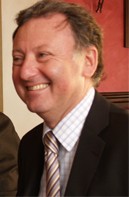Nice Première: Rudy Salles, you have participated in 3 parliamentary committees over 11 years on sects. How would you define this phenomenon?
 Rudy Salles: There are nearly 200 sects in France, which represents about 300,000 followers. It is therefore a very worrying phenomenon because people who get caught in the nets of sects lose their freedom, their free will, their bearings, and find it extremely difficult to get out. Sects often pass themselves off as religions. However, I want to point out that one of the main differences between sects and religions is that you can leave a religion whenever you wish; in any case, you have the freedom to come and go, to live in society and with your family, which is not possible in sects.
Rudy Salles: There are nearly 200 sects in France, which represents about 300,000 followers. It is therefore a very worrying phenomenon because people who get caught in the nets of sects lose their freedom, their free will, their bearings, and find it extremely difficult to get out. Sects often pass themselves off as religions. However, I want to point out that one of the main differences between sects and religions is that you can leave a religion whenever you wish; in any case, you have the freedom to come and go, to live in society and with your family, which is not possible in sects.
NP: What are the current means to curb this in France?
RS: For 11 years, the French Parliament and the National Assembly, in particular, have been very active in the fight against sects. We have successfully conducted three investigative committees. The first, in 1995, assessed the state of this phenomenon in France; the second, in 1999, investigated the financial networks of sects, and the third looked into the situation of minors recruited into sects. We passed a law that strengthened the offense of abuse of weakness. Furthermore, I proposed an amendment that was adopted, allowing associations recognized as being of public utility and fighting against sects to act as civil parties in place of the victims. Indeed, there were very few lawsuits before this, as victims were often too weakened to dare to bring sects to court. These advances are important. Not only do they provide new tools to fight against sects, but they also send a strong signal to sects that France clearly opposes them.
NP: Minors seem to be potential targets; how can we protect these easy prey?
RS: They are easy prey because they are drawn into sects by their parents. Children do not have the ability to say no because they have to say no to the sects but also to their parents, which is impossible. Some children are born into sects and know nothing of society. This is unacceptable because it robs young people of their childhood. We need to see the damage this causes to these children and later, even when they become adults and manage to escape. Protective measures must be taken. We must limit homeschooling as much as possible so that children’s education can be monitored by public authorities. It is also crucial to strengthen health checks because many children do not even receive essential care in case of illnesses. We also propose that grandparents should be able to intervene to report any anomalies they may notice in their grandchildren’s education that might suggest sectarian drift. This intergenerational solidarity seems like a very good idea to me.
NP: Do you think Nice and the Alpes-Maritimes are fertile grounds for sectarian movements?
RS: Unfortunately, the standard of living and the anonymity of large cities favor the establishment of sects. The Provence-Alpes-Côte d’Azur Region ranks third nationally for the number of registered sects, after the Île-de-France and Rhône-Alpes Regions. And unfortunately, in our region, the Alpes-Maritimes are not lagging behind.
NP: What do you think of Scientology?
RS: It is a sect that aims to make money, a lot of money. Its leaders do not even deny this. The problem is that this sect is accepted in the United States and has zealous propagandists like Tom Cruise or John Travolta, which tends to give it a positive “show biz” image. But the other side of the coin is very different. Having interviewed former members, I can say that their testimonies were very moving and highlighted a painful journey. This sect has done a lot of proselytizing in our department a few years ago.
NP: This “church” has significant premises in Nice and close to your office. What is your feeling about this?
RS: Scientology tries to normalize itself, to integrate into the landscape. But I advise those passing by their facade not to stop because their methods are capable of trapping even the strongest characters. Initially, sects attract their prey by trying to seduce them. And then, once you take the first step, their hold extends until you can no longer react. After that, you no longer belong to yourself; you belong to the sect.
NP: Finally, what measures would you take if you were the head of state?
RS: We have proposed many measures over the past 11 years to the National Assembly. The state can draw from this pool since each one seems useful to me in the fight against sects. Those we recently implemented for the protection of minors are sensible measures. But what I demand above all is vigilance from state services. We have regularly warned them, but we have the impression that the state machinery is cumbersome, if not unresponsive. I would not accuse the state of being complacent, although there have been attempts at infiltration by sects. But sometimes public services lack the necessary training to be able to detect and neutralize sects. And that must change!


